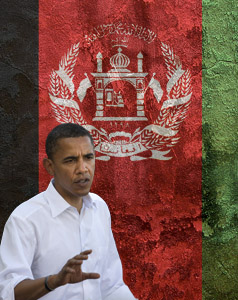A bipartisan group of legislators wrote a letter to President Barack Obama to oppose his call to increase the number of US troops in Afghanistan. The group consists of Sen. Russ Feingold (D-Wis.), Rep. Jim McGovern (D-Mass.) and Rep. Walter Jones (R-N.C.).
Feingold, McGovern and Jones said they think that Congress should debate and vote on an increase in troops for the eight-year war in Afghanistan. The bipartisan group also opposes the increase because the three men said they think it could undermine the United States’ ability to address the global threat posed by al Qaeda, and they expressed concern for the loss in lives and resources from the war, as well as concern that the war creates many mental health troubles such as post-traumatic stress disorder and suicide among many soldiers.
In the letter, the members wrote,”Congress should vote on whether to continue an armed nation-building campaign in Afghanistan that has already cost the lives of over eight hundred brave American men and women and hundreds of billions of dollars.”
When President Obama gave his presidential address on Tuesday night, he said that we owe our people and troops a complete review of the war in Afghanistan and that it is a vital necessity to send 30,000 more troops to Afghanistan, starting in early 2010, to target the insurgency and secure key population centers. “I do not make this decision lightly,” Obama said.
Obama estimated that $30 billion would be spent this year on the war in Afghanistan, and he said the security of not only Americans but also people in Afghanistan and Pakistan is at stake. He said he aims for the troops to disrupt and dismantle al Qaeda and to deny al Qaeda a safe haven for violent extremism in Afghanistan. Obama also said he aims to start sending troops home after 18 months and hopes for a “responsible transition of our forces out of Afghanistan.”
Feingold, McGovern and Jones wrote the president, “We appreciate your thoughtful deliberation on this topic and commend you for saying when you will begin to reduce our large-scale military presence in Afghanistan.†But we cannot support your decision to prolong and expand a risky and unsustainable strategy in the region.
“While we support ongoing civilian engagement in Afghanistan and counterterrorism efforts in the region, we do not believe more American lives should be risked to support an illegitimate, corrupt government fighting what is largely a civil war.”
Obama said that extra troops in Afghanistan would increase the United States’ ability to train competent Afghan security forces and to partner with them so that more Afghanis can get into the fight and so that the troops will help create the conditions for the US to transfer responsibility to the people in Afghanistan.
The three congressmen said that sending more troops to Afghanistan is “unlikely to help, and could hurt, our efforts to address al Qaeda’s safe haven in Pakistan.”Also, they said al Qaeda and its affiliates are also located in Yemen, Somalia, North Africa and other places around the world.”Rather than investing so many of our resources in Afghanistan, we should pursue a comprehensive, global counterterrorism strategy,” they said.
Feingold, McGovern and Jones expressed doubt that the US military objectives that the Obama administration has identified may not be achievable and that a troop buildup could be counterproductive. “There is a serious danger that the ongoing, large-scale US military presence will continue to provoke greater militancy in the region and further destabilize both Afghanistan and nuclear-armed Pakistan,” they said. “The pursuit of unrealistic nation-building goals is making it harder to isolate members of al Qaeda from those who do not have an international terrorist agenda.”
The group of congressmen also expressed concern for the strain that sending extra troops to Afghanistan would put on people in the military and their communities.
“In spite of the military’s best efforts, suicide and post-traumatic stress rates continue to soar,” they said. “The ability of individual service members and their units to rest, recuperate, retrain and re-equip themselves for redeployment is stretched beyond its limits. Finally, our ability to care for the wounded is severely over-burdened.”
Also, Feingold, McGovern and Jones said they are really concerned about the cost of sending more troops. “At a time when our country faces record deficits, and many Americans are struggling to make ends meet, it simply does not make sense to spend tens of billions of dollars to escalate our military involvement in Afghanistan,” they said.
They asked Obama to reconsider his decision and urged him not to send any extra troops to Afghanistan “until Congress has enacted appropriations to pay for the cost of such an increase, and that you propose reductions in spending to pay for the cost of any military operations in Afghanistan.”
Such an important decision shouldn’t be made without the support of the American people and their representatives in Congress, they said.”History has shown that our national security is often best served when the political branches work together to form a consensus on major strategic decisions,” they said. “Congress should vote on whether to continue an armed nation-building campaign in Afghanistan that has already cost the lives of over eight hundred brave American men and women and hundreds of billions of dollars.”
Join us in defending the truth before it’s too late
The future of independent journalism is uncertain, and the consequences of losing it are too grave to ignore. To ensure Truthout remains safe, strong, and free, we need to raise $50,000 in the next 9 days. Every dollar raised goes directly toward the costs of producing news you can trust.
Please give what you can — because by supporting us with a tax-deductible donation, you’re not just preserving a source of news, you’re helping to safeguard what’s left of our democracy.
